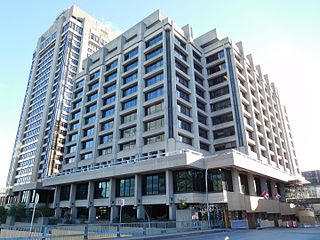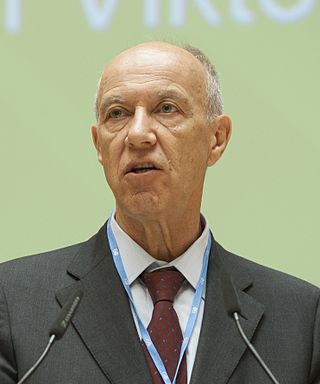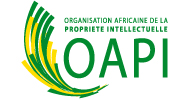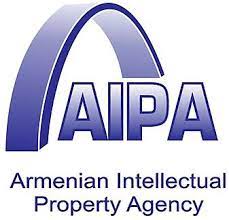
A patent is a type of intellectual property that gives its owner the legal right to exclude others from making, using, or selling an invention for a limited period of time in exchange for publishing an enabling disclosure of the invention. In most countries, patent rights fall under private law and the patent holder must sue someone infringing the patent in order to enforce their rights.

copyrightThe World Intellectual Property Organization Copyright Treaty is an international treaty on copyright law adopted by the member states of the World Intellectual Property Organization (WIPO) in 1996. It provides additional protections for copyright to respond to advances in information technology since the formation of previous copyright treaties before it. As of August 2023, the treaty has 115 contracting parties. The WCT and WIPO Performances and Phonograms Treaty, are together termed WIPO "internet treaties".

The World Intellectual Property Organization is one of the 15 specialized agencies of the United Nations (UN). Pursuant to the 1967 Convention Establishing the World Intellectual Property Organization, WIPO was created to promote and protect intellectual property (IP) across the world by cooperating with countries as well as international organizations. It began operations on 26 April 1970 when the convention entered into force. The current Director General is Singaporean Daren Tang, former head of the Intellectual Property Office of Singapore, who began his term on 1 October 2020.
The Patent Cooperation Treaty (PCT) is an international patent law treaty, concluded in 1970. It provides a unified procedure for filing patent applications to protect inventions in each of its contracting states. A patent application filed under the PCT is called an international application, or PCT application.
A patent office is a governmental or intergovernmental organization which controls the issue of patents. In other words, "patent offices are government bodies that may grant a patent or reject the patent application based on whether the application fulfils the requirements for patentability."

The Canadian Intellectual Property Office is responsible for the administration and processing of the greater part of intellectual property (IP) in Canada. CIPO's areas of activity include patents, trademarks, copyright, industrial designs and integrated circuit topographies. Structurally, CIPO functions as a special operating agency (SOA) under Innovation, Science and Economic Development Canada. CIPO is based in Gatineau, Quebec, part of the National Capital Region. CIPO’s Chief Executive Officer is Konstantinos Georgaras.
Intellectual property rights (IPRs) have been acknowledged and protected in China since 1980. China has acceded to the major international conventions on protection of rights to intellectual property. Domestically, protection of intellectual property law has also been established by government legislation, administrative regulations, and decrees in the areas of trademark, copyright, and patent.

A utility model is a patent-like intellectual property right to protect inventions. This type of right is available in many countries but, notably, not in the United States, United Kingdom or Canada. Although a utility model is similar to a patent, it is generally cheaper to obtain and maintain, has a shorter term, shorter grant lag, and less stringent patentability requirements. In some countries, it is only available for inventions in certain fields of technology and/or only for products. Utility models can be described as second-class patents.
Intellectual property law in Romania has developed significantly in the period since the Romanian Revolution of 1989 because of the need to enforce various regional and international treaties and agreements, such as the Agreement on Trade-Related Aspects of Intellectual Property Rights (TRIPS), the European Directives on Biotechnological Inventions, on Trademarks and Geographical Indications, and on Supplementary protection certificates, the Trademark Law Treaty, the Patent Law Treaty, and the European Union regulation on the Community Trademark, and the need to harmonize domestic patent law with the European Patent Convention (EPC) and with the European Union.

Francis Gerard Gurry is an Australian lawyer who served as the fourth director general of the World Intellectual Property Organization (WIPO) from 2008 to 2020. During that time, he was also the secretary-general of the International Union for the Protection of New Varieties of Plants (UPOV). Gurry also served as a deputy director general of WIPO from 2003 to 2008.

The Organisation Africaine de la Propriété Intellectuelle or OAPI is an intellectual property organization, headquartered in Yaoundé, Cameroon. The organisation was created by Bangui Agreement of March 2, 1977. The Bangui Agreement was subsequently amended in 1999.
Intellectual property organizations are organizations that are focused on copyrights, trademarks, patents, or other intellectual property law concepts. This includes international intergovernmental organizations that foster governmental cooperation in the area of copyrights, trademarks and patents, as well as non-governmental, non-profit organizations, lobbying organizations, think tanks, notable committees, and professional associations.

The Agreement on Trade-Related Aspects of Intellectual Property Rights (TRIPS) is an international legal agreement between all the member nations of the World Trade Organization (WTO). It establishes minimum standards for the regulation by national governments of different forms of intellectual property (IP) as applied to nationals of other WTO member nations. TRIPS was negotiated at the end of the Uruguay Round of the General Agreement on Tariffs and Trade (GATT) between 1989 and 1990 and is administered by the WTO.
The Corporate Affairs and Intellectual Property Office (CAIPO) is a Barbadian governmental agency in charge of various aspects of industrial property right affairs including: patents, trademarks, and industrial designs. It is a division of the Ministry of Industry & International Business. The CAIPO office is located on Belmont Road, Saint Michael, Barbados. The country ranks as one of the top countries where the greatest number of foreign patents are legally based.

Iran is a member of the WIPO since 2001 and has acceded to several WIPO intellectual property treaties. Iran joined the Convention for the Protection of Industrial Property in 1959. In December 2003 Iran became a party to the Madrid Agreement and the Madrid Protocol for the International Registration of Marks. In 2005 Iran joined the Lisbon Agreement for the Protection of Appellations of Origin and their International Registration, which ensures the protection of geographical names associated with products. As at February 2008 Iran had yet to accede to The Hague Agreement for the Protection of Industrial Designs.
Republic Act No. 8293, otherwise known as The Intellectual Property Code of the Philippines lays down the rules and regulations that grant, and enforce patents in the Philippines. Patents may be granted to technical solutions such as an inventions, machines, devices, processes, or an improvement of any of the foregoing. The technical solution must be novel, innovative, and industrially useful. In order for a technical solution to be granted a patent, the inventor must file an application to the Bureau of Patents, which will examine, and in some cases, grant its approval. The law is designed as to foster domestic creativity, to attract foreign investors, and to motivate inventors to release their products for public access.
The Constitution of Azerbaijan generally recognizes the right to intellectual property (IP), and ensures the protection of IP rights of all persons. In order to clarify the norm of Constitution, and establish the legal basis of the protection of intellectual property rights, the parliament of Azerbaijan approved some laws, and ratified international agreements.

Daren Tang Heng Shim is the fifth and current Director General of the World Intellectual Property Organization (WIPO). He is also Secretary-General of the International Union for the Protection of New Varieties of Plants (UPOV). Tang previously headed the Intellectual Property Office of Singapore (IPOS) and was a trade lawyer for the government of Singapore.

The Intellectual Property Agency of Armenia (AIPA) is the patent office of Armenia. The agency works under the supervision of the Ministry of Economy of Armenia and is tasked with granting patent and IP address protections, trademarks, and copyrights for objects of industrial property, inventions and usage patterns, industrial design, and commercial and service marks, among others.

Rena Lee is the ambassador for Singapore Oceans and Law of the Sea issues, special envoy of the Minister for Foreign Affairs, and ambassador for international law. She is also the chief executive of the Intellectual Property Office of Singapore (IPOS), having taken over from Daren Tang. She was included in the Leaders category of Time Magazine's 2024 list of the 100 most influential people for her chairing of successful final negotiations, leading to an agreed text for the first international agreement under the United Nations Convention on the Law of the Sea (UNCLOS), on the Conservation and Sustainable Use of Marine Biological Diversity of Areas Beyond National Jurisdiction (BBNJ) more simply known as the High Seas Treaty.











